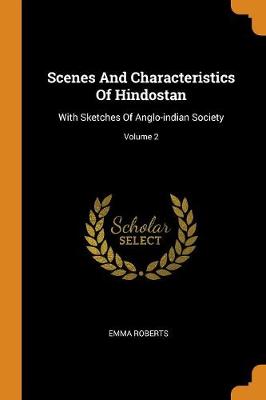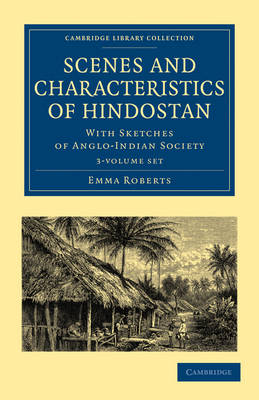Cambridge Library Collection - Travel and Exploration in Asia
1 primary work • 5 total works
Volume 1
Emma Roberts' 1835 work, compiled from articles she published in the Asiatic Journal, was well received in India and England. Roberts lived in India from 1828 with her sister and her brother-in-law who served in the 61st Bengal infantry. In 1830 she moved to Calcutta, where she edited and wrote for the Oriental Observer and contributed to periodicals and annuals. Returning to London in 1832, she threw herself into the literary world, publishing in several different fields. This book reveals Roberts' sympathetic attitude to the Indian people and her genuine interest in providing a thorough and honest report of their culture. Volume 3 covers topics including the position of women, shopping, gardening, manners, education, missionaries, politics, Anglo-Indian relations and the military establishment, as well as expanding on subjects discussed in the earlier volumes. For more information on this author, see http://orlando.cambridge.org/public/svPeople?person_id=robeem
Emma Roberts' three-volume book, published in 1835, was compiled from articles she had written for the Asiatic Journal, and was well received in both India and England. Roberts lived in India from 1828 with her sister and her brother-in-law who served in the 61st Bengal infantry. In 1830 she moved to Calcutta, where she edited and wrote for the Oriental Observer and contributed to periodicals and annuals. Returning to London in 1832, she threw herself into the literary world, publishing in several different fields. This book reveals Roberts' sympathetic attitude to the Indian people and her genuine interest in providing a thorough and honest report of their culture. It covers a wide range of topics including climate, flora and fauna, domestic and social life, education, colonial politics and military matters. For more information on this author, see http://orlando.cambridge.org/public/svPeople?person_id=robeem
Emma Roberts' 1835 work, compiled from articles she published in the Asiatic Journal, was well received in India and England. Roberts lived in India from 1828 with her sister and her brother-in-law who served in the 61st Bengal infantry. In 1830 she moved to Calcutta, where she edited and wrote for the Oriental Observer and contributed to periodicals and annuals. Returning to London in 1832, she threw herself into the literary world, publishing in several different fields. This book reveals Roberts' sympathetic attitude to the Indian people and her genuine interest in providing a thorough and honest report of their culture. Volume 3 covers topics including the position of women, shopping, gardening, manners, education, missionaries, politics, Anglo-Indian relations and the military establishment, as well as expanding on subjects discussed in the earlier volumes. For more information on this author, see http://orlando.cambridge.org/public/svPeople?person_id=robeem
Emma Roberts' 1835 work, compiled from articles she published in the Asiatic Journal, was well received in India and England. Roberts lived in India from 1828 with her sister and her brother-in-law who served in the 61st Bengal infantry. In 1830 she moved to Calcutta, where she edited and wrote for the Oriental Observer and contributed to periodicals and annuals. Returning to London in 1832, she threw herself into the literary world, publishing in several different fields. This book reveals Roberts' sympathetic attitude to the Indian people and her genuine interest in providing a thorough and honest report of their culture. Volume 2 begins by describing Allahabad in northern India, and covers a wide variety of topics including diamonds, geology, climate, flora and fauna, superstition, litigation, children, tourism and sport. For more information on this author, see http://orlando.cambridge.org/public/svPeople?person_id=robeem
Emma Roberts' 1835 work, compiled from articles she published in the Asiatic Journal, was well received in India and England. Roberts lived in India from 1828 with her sister and her brother-in-law, who served in the 61st Bengal infantry. In 1830 she moved to Calcutta, where she edited and wrote for the Oriental Observer and contributed to periodicals and annuals. Returning to London in 1832, she threw herself into the literary world, publishing in several different fields. This book reveals her sympathetic attitude to the Indian people and her genuine interest in providing a thorough and honest report of their culture. Volume 1 begins with a description of Calcutta. It reflects the diversity of Roberts' interests, covering topics from marriages to murders, domestic arrangements to military operations, religion to shopping, and architecture to dancing. For more information on this author, see http://orlando.cambridge.org/public/svPeople?person_id=robeem


